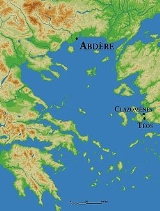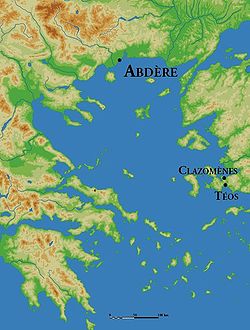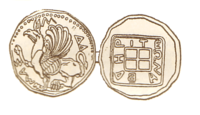
Abdera, Thrace
Encyclopedia
Abdera was a city-state
on the coast of Thrace
17 km east-northeast of the mouth of the Nestos, and almost opposite Thasos
. The site now lies in the Xanthi peripheral unit of modern Greece
. The municipality of Abdera, or Ávdira , has 18,573 inhabitants (2001). The seat of the municipality is in Genisea
.

 Its mythical foundation was attributed to Heracles
Its mythical foundation was attributed to Heracles
(on behalf of his fallen friend Abderus
), its historical one to a colony from Klazomenai. This historical founding was traditionally dated to 654 BC, which is unverified, although evidence in 7th century BC Greek pottery
tends to support it. But its prosperity dates from 544 BC, when the majority of the people of Teos
(including the poet Anacreon
) migrated to Abdera to escape the Persian
yoke (Herodotus
i.168). The chief coin type, a griffon
, is identical with that of Teos; the rich silver coinage is noted for the beauty and variety of its reverse types.
In 513 BC and 512 BC, the Persians conquered Abdera. In 492 BC
, the Persians again conquered Abdera, this time under Darius I. It later became part of the Delian League
and fought on the side of Athens in the Peloponnesian war
.
Abdera was a wealthy city, the third richest in the League, due to its status as a prime port for trade with the interior of Thrace and the Odrysian kingdom
.
A valuable prize, the city was repeatedly sacked: by the Triballi
in 376 BC
, Philip II of Macedon
in 350 BC
; later by Lysimachos of Thrace
, the Seleucids
, the Ptolemies
, and again by the Macedonians. In 170 BC
the Roman armies and those of Eumenes II of Pergamon
besieged and sacked it.
The town seems to have declined in importance after the middle of the 4th century BC. The air of Abdera was proverbial in Athens as causing stupidity, but the city counted among its citizens the philosophers Democritus
, Protagoras
and Anaxarchus
, and historian and philosopher Hecataeus of Abdera
.
The ruins of the town may still be seen on Cape Balastra; they cover seven small hills, and extend from an eastern to a western harbor; on the southwestern hills are the remains of the medieval settlement of Polystylon. Abdera is a titular see
of the Roman Catholic Church
in the province of Rhodope
on the southern coast of Thrace, now called Bouloustra.
The municipal unit Abdera is subdivided into the communities Abdera, Mandra, Myrodato
and Nea Kessani
. The community Abdera consists of the settlements Abdera, Giona, Lefkippos, Pezoula
and Skala.
City-state
A city-state is an independent or autonomous entity whose territory consists of a city which is not administered as a part of another local government.-Historical city-states:...
on the coast of Thrace
Thrace
Thrace is a historical and geographic area in southeast Europe. As a geographical concept, Thrace designates a region bounded by the Balkan Mountains on the north, Rhodope Mountains and the Aegean Sea on the south, and by the Black Sea and the Sea of Marmara on the east...
17 km east-northeast of the mouth of the Nestos, and almost opposite Thasos
Thasos
Thasos or Thassos is a Greek island in the northern Aegean Sea, close to the coast of Thrace and the plain of the river Nestos but geographically part of Macedonia. It is the northernmost Greek island, and 12th largest by area...
. The site now lies in the Xanthi peripheral unit of modern Greece
Greece
Greece , officially the Hellenic Republic , and historically Hellas or the Republic of Greece in English, is a country in southeastern Europe....
. The municipality of Abdera, or Ávdira , has 18,573 inhabitants (2001). The seat of the municipality is in Genisea
Genisea
Genisea is a town in the Vistonida municipal unit of the Xanthi peripheral unit of Greece. According to a 2001 census, the population of Genisea was around 2,576 inhabitants....
.
History


Heracles
Heracles ,born Alcaeus or Alcides , was a divine hero in Greek mythology, the son of Zeus and Alcmene, foster son of Amphitryon and great-grandson of Perseus...
(on behalf of his fallen friend Abderus
Abderus
In Greek mythology Abderus or Abderos was a divine hero, reputed a son of Hermes by some accounts, and eponym of Abdera, Thrace....
), its historical one to a colony from Klazomenai. This historical founding was traditionally dated to 654 BC, which is unverified, although evidence in 7th century BC Greek pottery
Pottery of Ancient Greece
As the result of its relative durability, pottery is a large part of the archaeological record of Ancient Greece, and because there is so much of it it has exerted a disproportionately large influence on our understanding of Greek society...
tends to support it. But its prosperity dates from 544 BC, when the majority of the people of Teos
Teos
Teos or Teo was a maritime city of Ionia, on a peninsula between Chytrium and Myonnesus, colonized by Orchomenian Minyans, Ionians, and Boeotians. The city is situated on a low hilly narrow strip of land connecting two larger areas of land . Teos ranked among twelve cities comprising the Ionian...
(including the poet Anacreon
Anacreon
Anacreon was a Greek lyric poet, notable for his drinking songs and hymns. Later Greeks included him in the canonical list of nine lyric poets.- Life :...
) migrated to Abdera to escape the Persian
Iran
Iran , officially the Islamic Republic of Iran , is a country in Southern and Western Asia. The name "Iran" has been in use natively since the Sassanian era and came into use internationally in 1935, before which the country was known to the Western world as Persia...
yoke (Herodotus
Herodotus
Herodotus was an ancient Greek historian who was born in Halicarnassus, Caria and lived in the 5th century BC . He has been called the "Father of History", and was the first historian known to collect his materials systematically, test their accuracy to a certain extent and arrange them in a...
i.168). The chief coin type, a griffon
Griffon
Griffon is a type of dog, a collection of breeds of originally hunting dogs. There are three recognized lines of the griffon type Fédération Cynologique Internationale FCI, the griffon vendéens, the wirehaired pointers, and the smousje...
, is identical with that of Teos; the rich silver coinage is noted for the beauty and variety of its reverse types.
In 513 BC and 512 BC, the Persians conquered Abdera. In 492 BC
492 BC
Year 492 BC was a year of the pre-Julian Roman calendar. At the time, it was known as the Year of the Consulship of Macerinus and Augurinus...
, the Persians again conquered Abdera, this time under Darius I. It later became part of the Delian League
Delian League
The Delian League, founded in circa 477 BC, was an association of Greek city-states, members numbering between 150 to 173, under the leadership of Athens, whose purpose was to continue fighting the Persian Empire after the Greek victory in the Battle of Plataea at the end of the Greco–Persian Wars...
and fought on the side of Athens in the Peloponnesian war
Peloponnesian War
The Peloponnesian War, 431 to 404 BC, was an ancient Greek war fought by Athens and its empire against the Peloponnesian League led by Sparta. Historians have traditionally divided the war into three phases...
.
Abdera was a wealthy city, the third richest in the League, due to its status as a prime port for trade with the interior of Thrace and the Odrysian kingdom
Odrysian kingdom
The Odrysian kingdom was a union of Thracian tribes that endured between the 5th and 3rd centuries BC. It consisted largely of present-day Bulgaria, spreading to parts of Northern Dobruja, parts of Northern Greece and modern-day European Turkey...
.
A valuable prize, the city was repeatedly sacked: by the Triballi
Triballi
The Triballi were an ancient tribe whose dominion was around the plains of southern modern Serbia and west Bulgaria, at the Angrus and Brongus and the Iskur River, roughly centered where Serbia and Bulgaria are joined....
in 376 BC
376 BC
Year 376 BC was a year of the pre-Julian Roman calendar. At the time, it was known as the Year of the Tribunate of Mugillanus, Lanatus, Cornelius and Praetextatus...
, Philip II of Macedon
Philip II of Macedon
Philip II of Macedon "friend" + ἵππος "horse" — transliterated ; 382 – 336 BC), was a king of Macedon from 359 BC until his assassination in 336 BC. He was the father of Alexander the Great and Philip III.-Biography:...
in 350 BC
350 BC
Year 350 BC was a year of the pre-Julian Roman calendar. At the time it was known as the Year of the Consulship of Laenas and Scipio...
; later by Lysimachos of Thrace
Lysimachus
Lysimachus was a Macedonian officer and diadochus of Alexander the Great, who became a basileus in 306 BC, ruling Thrace, Asia Minor and Macedon.-Early Life & Career:...
, the Seleucids
Seleucid Empire
The Seleucid Empire was a Greek-Macedonian state that was created out of the eastern conquests of Alexander the Great. At the height of its power, it included central Anatolia, the Levant, Mesopotamia, Persia, today's Turkmenistan, Pamir and parts of Pakistan.The Seleucid Empire was a major centre...
, the Ptolemies
Ptolemaic dynasty
The Ptolemaic dynasty, was a Macedonian Greek royal family which ruled the Ptolemaic Empire in Egypt during the Hellenistic period. Their rule lasted for 275 years, from 305 BC to 30 BC...
, and again by the Macedonians. In 170 BC
170 BC
Year 170 BC was a year of the pre-Julian Roman calendar. At the time it was known as the Year of the Consulship of Mancinus and Serranus...
the Roman armies and those of Eumenes II of Pergamon
Eumenes II
Eumenes II of Pergamon was king of Pergamon and a member of the Attalid dynasty. The son of king Attalus I and queen Apollonis, he followed in his father's footsteps and collaborated with the Romans to oppose first Macedonian, then Seleucid expansion towards the Aegean, leading to the defeat of...
besieged and sacked it.
The town seems to have declined in importance after the middle of the 4th century BC. The air of Abdera was proverbial in Athens as causing stupidity, but the city counted among its citizens the philosophers Democritus
Democritus
Democritus was an Ancient Greek philosopher born in Abdera, Thrace, Greece. He was an influential pre-Socratic philosopher and pupil of Leucippus, who formulated an atomic theory for the cosmos....
, Protagoras
Protagoras
Protagoras was a pre-Socratic Greek philosopher and is numbered as one of the sophists by Plato. In his dialogue Protagoras, Plato credits him with having invented the role of the professional sophist or teacher of virtue...
and Anaxarchus
Anaxarchus
Anaxarchus was a Greek philosopher of the school of Democritus. Together with Pyrrho, he accompanied Alexander the Great into Asia. The reports of his philosophical views suggest that he was a forerunner of the Greek skeptics.-Life:...
, and historian and philosopher Hecataeus of Abdera
Hecataeus of Abdera
Hecataeus of Abdera was a Greek historian and sceptic philosopher who flourished in the 4th century BC.-Biography:Diogenes Laertius relates that he was a student of Pyrrho, along with Eurylochus, Timon the Phliasian, Nausiphanes of Teos and others, and includes him among the "Pyrrhoneans"...
.
The ruins of the town may still be seen on Cape Balastra; they cover seven small hills, and extend from an eastern to a western harbor; on the southwestern hills are the remains of the medieval settlement of Polystylon. Abdera is a titular see
Titular see
A titular see in various churches is an episcopal see of a former diocese that no longer functions, sometimes called a "dead diocese". The ordinary or hierarch of such a see may be styled a "titular bishop", "titular metropolitan", or "titular archbishop"....
of the Roman Catholic Church
Roman Catholic Church
The Catholic Church, also known as the Roman Catholic Church, is the world's largest Christian church, with over a billion members. Led by the Pope, it defines its mission as spreading the gospel of Jesus Christ, administering the sacraments and exercising charity...
in the province of Rhodope
Rhodope
Rhodope may mean:* Queen Rhodope, a figure of Greek mythology* Rhodope Mountains, in Bulgaria and Greece* Rhodope Prefecture, of Greece* Rhodope * 166 Rhodope, an asteroid...
on the southern coast of Thrace, now called Bouloustra.
Municipality
The municipality Abdera was formed at the 2011 local government reform by the merger of the following 3 former municipalities, that became municipal units:- Abdera
- SeleroSeleroSelero is a village and a former community in the Xanthi peripheral unit, East Macedonia and Thrace, Greece. Since the 2011 local government reform it is part of the municipality Abdera, of which it is a municipal unit. Population 4,509 ....
- VistonidaVistonidaVistonida is a former municipality in the Xanthi peripheral unit, East Macedonia and Thrace, Greece. It was named after Lake Vistonida. Since the 2011 local government reform it is part of the municipality Abdera, of which it is a municipal unit. Population 10,147 . The seat of the municipality...
The municipal unit Abdera is subdivided into the communities Abdera, Mandra, Myrodato
Myrodato
Myrodato is a settlement in the Abdera municipal unit, Xanthi peripheral unit of Greece. It is located two kilometers west of Abdera. In 1981, the settlement had a population of around 668 inhabitants. In 1991, the population of Myrodato slightly rose to about 671 inhabitants.-External links:*...
and Nea Kessani
Nea Kessani
Nea Kessani is a settlement in the Abdera municipal unit, Xanthi peripheral unit of Greece....
. The community Abdera consists of the settlements Abdera, Giona, Lefkippos, Pezoula
Pezoula
Pezoula is a settlement in the Xanthi prefecture of Greece. It is part of the community, municipal unit and municipality of Abdera. It is located approximately four kilometers from Abdera. In 1991, the settlement contained 151 inhabitants.-External links:*...
and Skala.

